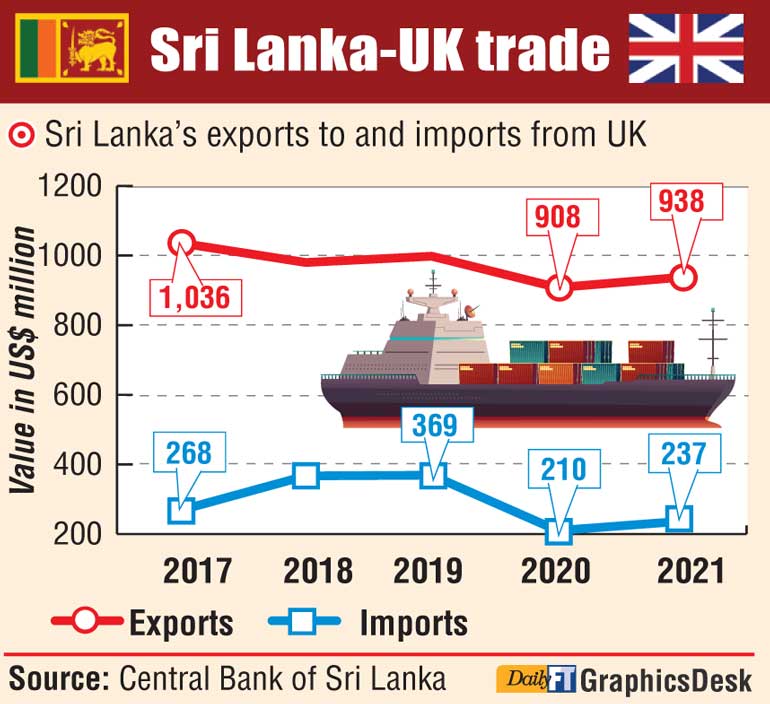Wednesday Feb 18, 2026
Wednesday Feb 18, 2026
Wednesday, 17 August 2022 00:26 - - {{hitsCtrl.values.hits}}
 The UK Government yesterday announced the launch of the Developing Countries Trading Scheme (DCTS) effective from early next year, replacing its Generalised Scheme of Preferences (GSP) scheme.
The UK Government yesterday announced the launch of the Developing Countries Trading Scheme (DCTS) effective from early next year, replacing its Generalised Scheme of Preferences (GSP) scheme.
DCTS applies to 65 countries including Sri Lanka, offering lower tariffs and simpler rules of origin requirements for exporting to the UK.
Sri Lanka has been categorised under those eligible for “Enhanced Framework/Preferences” along with Bolivia, Cape Verde, Kyrgyzstan, Mongolia, Pakistan, Philippines and Uzbekistan. The other three categories are Comprehensive preferences (with Bangladesh, Bhutan, Cambodia, Myanmar, Nepal among recipients), Standard preferences (India, Indonesia among others) and Economic Partnership Agreement.
The UK Government is also lowering or removing tariffs on an additional 156 products in DCTS Enhanced Preferences. The result of this change is that more than 85% of eligible lines now benefit from zero tariffs in DCTS Enhanced Preferences, covering trade worth around £ 2 billion.
Total trade in goods and services (exports plus imports) between the UK and Sri Lanka was £ 1.1 billion in the four quarters to the end of Q1 2022, an increase of 1.6% or £ 17 million from the four quarters to the end of Q1 2021.
Total UK exports to Sri Lanka amounted to £ 290 million (an increase of 16.0% or £ 40 million and total UK imports from Sri Lanka amounted to £ 779 million (a decrease of 2.9% or £ 23 million).
Sri Lanka was the UK’s 79th largest trading partner in the four quarters to the end of Q1 2022 accounting for 0.1% of total UK trade.
Sri Lanka's exports to the UK in the past five years have been averaging at $ 1 billion with the share of total declining to 7.5% last year from 9% in 2017. Imports from the UK account for around 1% of Sri Lanka’s total. In the past five years imports averaged around $ 200-370 million with the highest of $ 369 million in 2019 and lowest of $ 210 million in 2020.
Countries will lose DCTS Enhanced Preferences and move to DCTS Standard Preferences when their economies have developed enough to no longer be classified as economically vulnerable. The economic vulnerability assessment is revised in the DCTS, by suspending the criteria on export competitiveness and only applying the existing criteria on export diversification.
The Government intends to complete a review of alternative options for assessing economic vulnerability within one year of the DCTS launch with a view to refining the basis for this assessment. The Government grants DCTS Enhanced Preferences to existing GSP Enhanced Framework countries (without another preferential trading arrangement with the UK) for three years from the launch of the DCTS to ensure continuity for businesses.
UK Secretary of State for the Department for International Trade Anne-Marie Trevelyan said the DCTS aims to harness the power of trade to help developing countries grow and prosper.
“The new scheme offers developing countries one of the most generous sets of trading preferences of any country in the world. The scheme demonstrates the UK’s commitment to building long-term, mutually beneficial relationships with emerging economies that are home to more than 3.3 billion people,” she added.
According to her, the DCTS is a major milestone in growing free and fair trade with developing nations. It helps countries to diversify their exports and grow their economies, while British households and businesses benefit from lower prices and more choice. It also cuts administrative costs for businesses by reducing more tariffs and bringing more countries in scope of the most generous tariff reductions.
“It also cuts red tape for developing countries, for example by simplifying rules of origin requirements for the least developed nations. This helps the world’s poorest countries to export to the UK and play a more active part in fast growing global supply chains,” she said.
The DCTS aims to support sustainable growth in developing countries through a more generous unilateral offer. The new scheme also aims to demonstrate the UK’s leadership in the use of trade for development. This has led to provisions in the DCTS which reduce tariffs, liberalise rules of origin requirements and simplify the conditions attached to the scheme.
The policy paper on DCTS published on 16 August could be accessed online via https://www.gov.uk/government/publications/developing-countries-trading-scheme-dcts-new-policy-report/developing-countries-trading-scheme-government-policy-response#annex-one
